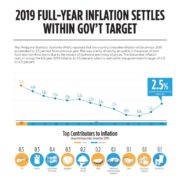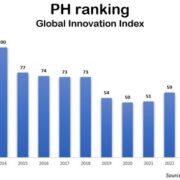
The National Economic and Development Authority (NEDA) is pleased with the news that the full-year inflation for 2019 settled at 2.5 percent, which is well within the government target of 2.0 to 4.0 percent.
The Philippine Statistics Authority (PSA) reported today that the country’s headline inflation for December 2019 further accelerated, as widely expected, to 2.5 percent.
This was mainly driven by the uptick in the prices of both food and non-food items due to the impact of typhoons and rising oil prices recorded during the month.
Rice prices posted softer deflation (-6.8% from -8.3% in November 2019) while inflation rose faster for fish (7.4% from 2.5% in November 2019) and vegetables (8.2% from 1.0% in November 2019).
“The country ended last year with steady inflation but the government must remain vigilant and proactive in managing the impact of potential sources of price pressures this year such as typhoons, continuing presence of African Swine Fever (ASF) in the country, and the heightened conflict in the Middle East.,” Socioeconomic Planning Secretary Ernesto M. Pernia said.
The Cabinet official added that the recovery and rehabilitation plans for the typhoon-affected areas must be immediately implemented and the production support programs for the affected farmers and fisherfolks must be fast-tracked.
“Over the medium to long-term, the agriculture, forestry, and fisheries sector must increasingly adopt climate and disaster-resilient technologies and best practices. Climate and disaster risks should also be considered in the program and project designs in the sector,” Pernia added.

He also mentioned other priority areas such as assisting farmers to shift to high-value, short-maturing, and high-yielding crops; and sustaining biosecurity measures and procedures until the ASF is fully eradicated. This will bring back confidence of consumers in pork products.
Pernia also cautioned that the escalating tension in the Middle East may disrupt global oil supply which could lead to a surge in the prices of petroleum products and overall inflation.
“The government should effectively manage expectations at the domestic front and be vigilant against any unwarranted increase in pump prices considering that the last tranche of excise tax increase on fuel products will be implemented this month,” he added.
Pernia further said that in the short-term, demand management and alternative sources of petroleum products should be explored, and over the medium to long-term, shifting away from fossil fuel and import dependence should be encouraged.
—
Stay updated with news and information from the National Economic and Development Authority by visiting their website at http://www.neda.gov.ph.






